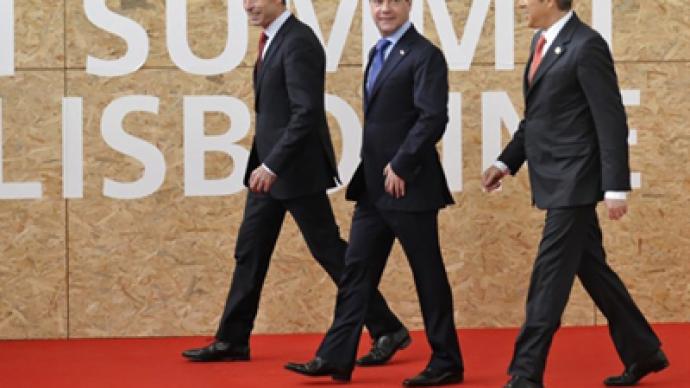Mutual claims period in relations with NATO over – Medvedev

Russia and NATO have managed to overcome divisive issues that have overshadowed their relations over the past years, stated President Dmitry Medvedev while speaking at the Russia-NATO Council in Lisbon.
“The declaration we adopted states that we are striving to strengthen the strategic partnership, and this means that in our relationship we have managed to overcome all the difficulties of the recent period,” Medvedev said at the news conference. Dmitry Medvedev was clear about Russia’s intentions:“We have acknowledged that the cold period of claims in Russia’s relations with NATO has ended, we are now looking with optimism into the future,” he said.“The fight against terrorism, drug trafficking, piracy-related issues, nuclear proliferation, weapons of mass destruction– all of these are topics in which we virtually have no differences,” he added.Earlier, opening the forum, NATO Secretary General Anders Fog Rasmussen said Russia has accepted the Alliance's proposal to work together on European missile defense. He explained that “the Alliance will acquire the capability to defend European territory and populations against missile attacks” with Russia’s help.“We extended the offer to Russia to cooperate with us. And I’m very pleased that President Medvedev has taken up that offer,” Rasmussen announced. Russia-NATO cooperation is needed to counter present-day challenges that pose a threat to world security, he added. Addressing the Council, US President Barack Obama also mentioned Russia’s willingness to work together with NATO in the field of missile defense. He also noted the importance of the new START treaty for European security – signed between Russia and the US in April. It still needs to be ratified and faces Republican opposition in the US Congress. “I have received overwhelming support from our allies here [in Europe] that the new START treaty is a critical component to US and European security,” Obama said. “We’ve seen comments from a wide range of European partners on this issue who have uniformly said they will feel safer and more secure if this treaty gets ratified.”Russia and NATO have already begun to work together in a number of areas, for example in Afghanistan, where both parties realize the need for a joint security system. The alliance here mainly relies on Russia for providing transit routes for its troops, necessary for delivering humanitarian aid.“Russia has its own history in Afghanistan and I would not foresee again Russian boots on Afghan soil,” Dr. Hans-Friedrich von Ploetz, former German Ambassador to Russia and a former representative to the NATO Council, told RT.“But having said that, there are many ways in which Russia can express its own interest in successful operation under the UN mandate of NATO, and Russia is already doing a lot today. Let me only mention the transit of supplies for the allied forces in Afghanistan. I think more than 50 per cent are now going through Russia,” he explained.
It seems that this co-operative mood can be transferred to other areas of potential joint work, specifically the anti-missile defense system in which NATO wants to include Russia. One of the NATO new goals is to play a more important global role, which is impossible without establishing secure relations with Russia and other emerging centers of power, like China, India and Brazil, claims Yury Rogulev, head of the Franklin Roosevelt Foundation of US Studies at Moscow State University. However, he believes that this need for co-operation is mutual, as, being neighbors, Russia and NATO certainly cannot ignore each other.“If we don’t have any kind of co-operation, we will have adversarial relations and remain a potential threat to each other,” Rogulev told RT.
The second day of the summit has begun with a discussion about the alliance strategy in Afghanistan, and the Russia-NATO Council has started with President Medvedev arriving to Lisbon.The NATO summit opened on Friday in the Portuguese capital, with the first day being dedicated to the alliance itself: the members have discussed their future goals and have ratified a new strategic concept. However, no other major decisions have been taken so far. NATO finds itself today in search of a new identity, as the old one has become somewhat obsolete. It has been frequently said that the organization is being pulled in too many different directions and that there is no clear unified policy for its strategic development.With Russia turning from a foe into an ally and with Western countries growing stronger and steadier by the day, NATO is beginning to lose its focus and the new wave of co-operation with Russia is perceived as a new lease on life for the organization.“Neither the European Union, nor the Council of Europe, nor the Organization for Security and Co-operation in Europe could possibly take its [NATO’s] place. So, either it’s going to be a different type of NATO, or a new organization all together,” explained Dr. Adrian Pabst, a professor of politics at the University of Kent.“There doesn’t seem to be any appetite in the West or elsewhere for the moment to set up a new organization. Therefore, it’s better to expand NATO, to bring Russia onboard,” he concluded.
Signing the new strategic concept is also considered a good sign of NATO being capable of producing a unified policy and being a stable international organization, similar to the UN, and not just a ghost of the past.











